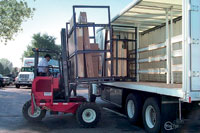Everything’s available
One might attribute vendors’ bending over backwards for special orders to their scrambling for sales in a dismal housing market. Whatever the reason, it’s encouraging dealers to cast their nets wider for customers with unique product needs.
Special orders accounted for 25% of all sales for 124 dealers that responded to the LBM Institute’s 2007 Cost of Doing Business survey. Special orders are typically more prevalent for dealers catering to custom builders, like PBS, which Isley says “built our business around special orders.” They now account for 35% of PBS’ annual revenue. “It’s not uncommon for us to have 20, 25 different special orders for doors in our warehouse, waiting to be shipped.”
While not the epitome of customer service it once was, special ordering reaffirms dealers’ importance to their customers, particularly when requests fall outside the parameters of what the yards stock.
“You can get pretty much anything you want, and we have no reservations about what we can sell, as long as we can make money on it,” says Buck Byers, president of Barr Lumber in San Bernardino, Calif., which last year processed special orders for $10,000 generators.
Scott Whiddon, president of Causeway Lumber, recalls an order several years ago for doors made from English sycamore, which had to be placed six months in advance of shipment to coincide with that wood’s harvest season.
Florida-based Causeway also does business with companies on Caribbean islands that regularly ask the dealer to procure plumbing and lighting that its stores don’t carry. “The challenge is to get our salespeople to feel empowered,” to call suppliers or search the Internet to fill those orders, he says.
None of the dealers contacted for this article charges extra for special orders. But margins are usually higher than for stocked inventory, and dealers say they need that cushion to protect themselves against getting stuck with misorders for unique products they can’t resell, or to cover the costs of delayed deliveries–a reasonable concern when builders are reporting cancellation rates as high as 60%.
Bringing back the ‘dead’
Managing inventory is a critical component of any dealer’s special-order business. Barr Lumber assigns numbers to each special order so it can track the items’ locations at any given moment.
To help dealers manage this inventory, Sunbelt Material Handling sells portable millwork racking systems that are transportable onto delivery trucks. “Doors and windows are labor intensive, and anything we can do that eliminates ‘touches’ helps dealers,” says Clint Darnell, Sunbelt’s vice president.
But managing special orders is also about managing expectations, which is why dealers prefer taking special orders from established customers and getting half the price upfront. Even that policy won’t eliminate disputes, as Barr found out last year when a $50,000 order for clear Douglas fir went bad because of delivery snags. That customer was a charge account and wasn’t pre-billed, so when it went someplace else for the wood, Barr was left holding the bag.
“There wasn’t much we could do, because we missed some things,” says Byers, who thinks his company might end up eating $20,000 of that purchase. As a result, Barr limits what its salespeople can order and scrutinizes any request exceeding $10,000.
Every dealer dreads “dead” stock that can’t be reinserted into the supply chain. And dealers that expand their special-order businesses need outlets where they can dispose of these products without taking a bath. PBS has a handful of regular customers it sells dead items to, and every six months it donates merchandise to Habitat for Humanity. When a non-stocked item goes dead because of an ordering error, PBS’ nine outside salespeople–all of whom are compensated based on a sale’s margin–can give the customer a credit, “but the salesman takes a 100% margin hit until that product is sold,” Isley says. Dead items get new SKUs and go into a separate area in PBS’ warehouse, where they are tracked monthly. Any salesperson can draw from that inventory and can exercise pricing latitude.
At the end of the year, PBS awards the seller with the lowest dead-stock balance. “You don’t want to be at the bottom of that list,” Isley says.
–John Caulfield is a contributing editor to ProSales.

